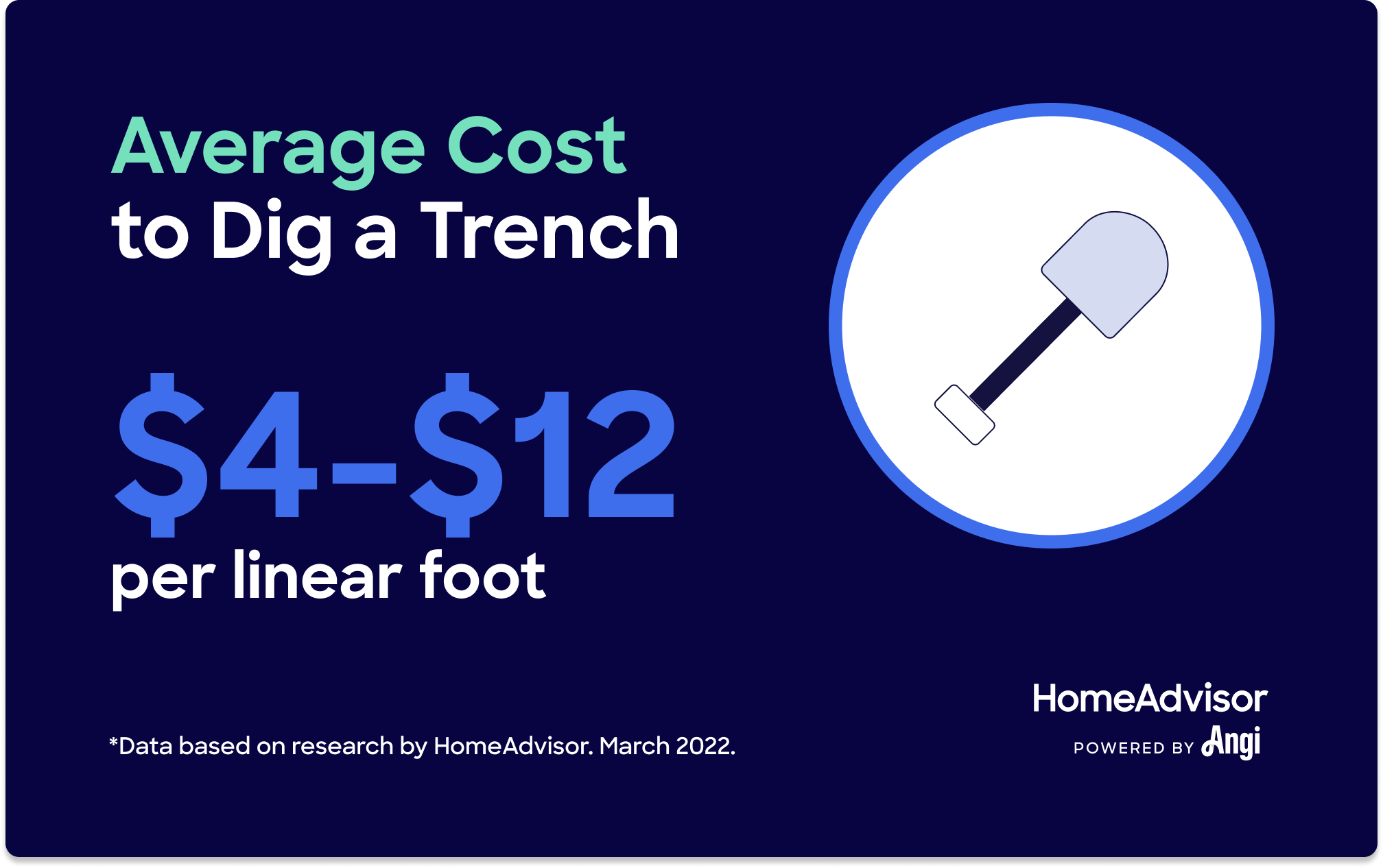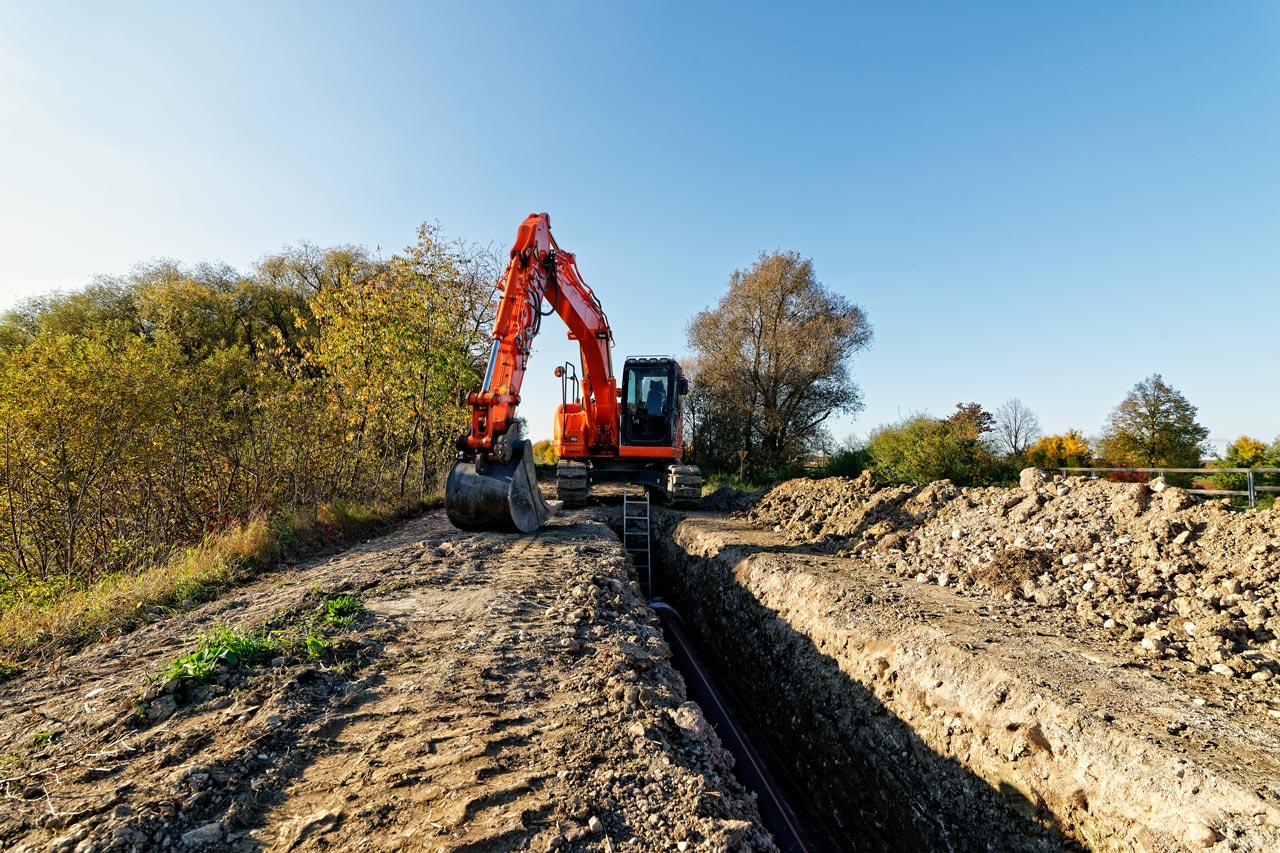How Much Does Trenching Cost per Foot?
Typical Range:
$400 - $1,200
Typical Range:
$400 - $1,200
Cost data is based on research by HomeAdvisor.
Updated July 5, 2022
Written by HomeAdvisor.The average cost to dig 100 linear feet of trench is $800. Smaller projects can run as little as $400, while more expensive ones are about $1,200. The cost per linear foot ranges between $4 and $12.
Professionals use trenches to place utilities underground, install lawn sprinklers, or devise a drainage system on your property. Conduit, using half-inch non-metallic PVC pipe, adds about $0.25 per foot. Copper, the most common material for water lines, can add between $10 and $20 per foot. The average price per foot of sewer line ranges from $50 to $250. Gas line, using 1-inch polyethylene pipe, adds $0.66 per foot.
Trenches, usually deeper than they are wide, play a big part in the construction and maintenance of infrastructure. In addition to utilities, pros dig trenches to construct retaining walls.
There are a few things to do before digging:
Check to see if any city or county permits are necessary. Permits typically cost between $500 to $2,000.
Homeowners should also check for existing utility lines before putting a shovel in the ground. Hire a land surveyor to do that for between $200 to $800.
You may need to clear the site of landscaping or trees. The averagecost to remove a tree is $750, but it can range between $200 and $2,000.
2022 Notice: Material Prices Are Surging
Demand for siding and other building materials has grown over the past year. And as a result, manufacturers are increasing materials prices. Prices have gone up 5% to 10% this year, and many parts of the country are experiencing long delivery times. If you're planning a building project, we recommend starting as early as possible in the season, preparing for potential price fluctuations, and allowing extra time to order materials.
Let's calculate cost data for you. Where are you located?
Where are you located?
| National Average | $800 |
| Typical Range | $400 - $1,200 |
| Low End - High End | $400 - $1,200 |
Cost data is based on research by HomeAdvisor.
Many factors influence the cost to dig a trench, the biggest being the length of the trench. Other considerations include the type of trench and the cost of permits.
Digging a trench costs an average of $8 per linear foot, including equipment and labor. Doing it yourself eliminates labor and puts the price at an average of $2.25 per linear foot, assuming you have enough time and the right equipment. However, we recommend hiring a pro to dig your trench.
| Trenching | Cost Range | Average Cost |
|---|---|---|
| Equipment (Trencher) | $1.75 – $2.50 | $2.12 |
| Labor* | $2.25 – $9.50 | $5.87 |
| Total Per Linear Foot | $4 – $12 | $8 |
| Total Per 100 Linear Feet | $400 – $1,200 | $800 |
| Project | Cost Range Per Lot* | DIY vs. Hire a Pro |
|---|---|---|
| Drainage | $1,900 – $5,100 | Either |
| Electrical | $600 – $2,100 | Hire a Pro |
| Water | $600 – $2,400 | Hire a Pro |
| Sewer | $1,400 – $4,600 | Hire a pro if not completed by city/county |
| Gas | $300 – $800 | Hire a Pro |
| HVAC | $3,800 – $7,200 | Hire a Pro |
| Foundations | $4,300 – $13,300 | Hire a Pro |
| Retaining Walls | $2,900 – $7,800 | Either |
*Includes labor, equipment, support materials and cleanup.
Installing a drainage system costs between $2,000 and $6,100. These are ideal for driveways or other stretches of pavement.
An exterior French drain typically costs $20 to $30 per linear foot. An interior system is an average of $45 to $60 per linear foot. A French drain uses gravity, gravel, and a perforated pipe to direct water away from the home. It's a popular and comparatively inexpensive option, but it's slower to remove water than a channel system.
A trench or channel driveway drainage system costs an average of $70 per linear foot. This system features a flush grate surface in the ditch to rapidly redirect water and stop it pooling on the driveway.
Installing electrical wiring or a panel usually costs between $600 and $2,100. Larger properties, having multiple outbuildings, or an unusual layout can increase project price.
While you can dig the trench yourself, if you have the equipment and know-how, the actual utility installation is not a DIY job. Only hire a licensed electrician; electrician costs range between $50 and $100 per hour. Most states require a qualified electrician to carry out all electrical work, however small.
Several home projects require electrical trenching:
Surveillance camera: Installing a security system costs about $1,400.
Indoor/outdoor outlet: Homeowners pay an average of $200 to install or replace electrical and ground-fault circuit interrupters. Take additional precautions for outdoor outlet safetyby investing in covers that protect from exposure to water.
Lighting: The average cost to install a lighting fixture is $500.
Swimming pool/hot tub: In-ground swimming pool installation costs about $55,700. A typical turn-key pool package includes the electrical system needed. In-ground hot tubs cost between $5,000 to $20,000, including the digging and electrical and plumbing work.
For most homeowners, installing a water main costs between $600 and $2,600. This is not a DIY job. Instead, hire a licensed professional plumber to do the work from the beginning to avoid higher costs down the road. Regional temperatures may affect the type of pipe you can use. Copper pipe is a popular choice for most climates, but adds $10 to $20 per linear foot to your total.
Other projects that require this include:
Well work: Drilling or digging a well costs $1,500 to $12,000. The average price is $5,500. Most homeowners spend $1,550 to install or replace a well pump, but prices vary based on pump type. Repairing a well pump runs about $900.
Sprinkler system: The average cost to install a sprinkler system is $2,500. Have a professional check for existing pipes and wires before digging and putting in pipes.
Swimming pool/hot tub:
Swimming pool: Approximately $48,500.
Hot tub: Between $5,000 to $20,000.
Water heater: The cost to install a water heater runs most homeowners between $800 and $1,600. Invest in an expansion tank to avoid having pipes burst. Repairing a water main costs on the high end $3,000 and about $300 on the low end.
Installing a sewer main costs about $3,200. The property type is the biggest cost factor here. The type and location of the property, as well as the landscape, determine how challenging the job is, the length of the trench and the distance from the main connector line, and what permits are necessary.
Permits and regulations are a factor in any sewer-related project. If a city or county isn't responsible for installing sewer lines, hire a professional.
Four-inch PVC pipe adds approximately $1 to the price per linear foot. Plastic pipe ties easily into older systems.
Installing or repairing gas pipes typically costs between $300 and $800. The kind of gas used and the appliance to which the line connects determines the type of pipe.
The cost of a geothermal heating or cooling system runs between $12,800 and $35,000.
There are three types of configurations for the geothermal system: horizontal, vertical and pond. The trench for a pond configuration will be about $10 to $20 per linear foot.
If you're using two-inch black steel pipe or copper pipe, expect to pay around $12 per linear foot. You'll also need to account for insulating the lines to maximize efficiency for your HVAC system. This adds another $1 to $3 per linear foot.
Typically, excavation and grading cost between $1,350 and $5,600. The terrain and geology of the area influence cost. Difficult terrain, challenging geology, and steep grading increase difficulty and labor, and, therefore, cost.
The price of a foundation project ranges from $4,300 to $13,300. What it's made of can increase or decrease that number. For example, a monolithic concrete slab costs about $4 per square foot, but basement foundation costs about $18 per square foot.
Certain types of retaining walls need trenches. The price of installing a retaining wall runs most homeowners between $3,200 and $8,800. This is the price for the entire project, including trenching.
While costs vary widely across the country, average trenching permits cost between $500 to $2,000.
In some circumstances, it's possible to save money by digging a trench yourself. For example, you can dig a standard trench (24 inches deep and 8 inches wide), as long as you bring in a contractor to install the utilities. However, the need to rent equipment offsets what you’ll save on labor.
For smaller jobs, good, old-fashioned shovels and spades will do the job and only cost $12 to $100 each. For larger jobs, you'll need to rent a trencher. Micro trenchers cost around $100 to $125 per day, and an 18-inch trencher costs roughly $90 to $120 per day.
While you can save on labor costs by digging a trench yourself, unless you dig it out with a spade, you negate all savings when you rent trenching equipment. Plus, it'll take you much longer to dig the trench than it would a team of pros. And there's the physical cost. Even though the job is relatively simple, it requires a lot of strenuous physical activity. So, before you dive in, be sure you have the time and physical ability to complete the job.
If you're in any doubt, hire a pro to do the (literal) heavy lifting for you. A seasoned pro can comparatively quickly dig the trench you need and clean up after themselves. And you don't have to undertake any of the strenuous labor yourself.
Calculate the volume of a trench, or the excavation volume, in cubic feet, with a simple formula.
Width x Length x Depth = Volume.
Example: A 24-foot trench that's 4 feet deep and 3.5 feet wide.
24 x 4 x 3.5 = 336 cubic feet.
The depth of a trench depends on its purpose. In general, a drainage trench should be at least 18 inches deep.
Trenching is the process of digging trenches, often for utilities, from the top, down. Once the correct width, length, and depth, and the utilities are in place, a pro backfills the hole with the dug-out soil.
Boring involves directional drilling, without digging, beneath the ground, along a predetermined route. Once the bore is complete, power lines or other utilities can be run through the bore, without the need for digging up the surface.

